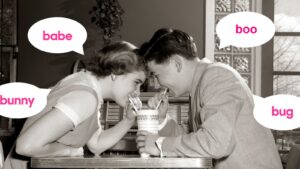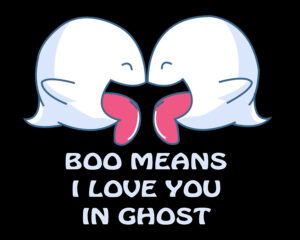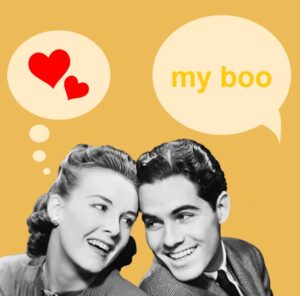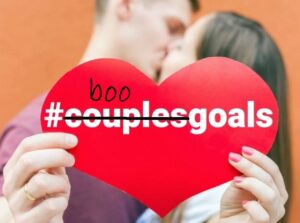What does it mean when your significant other calls you boo? Surprisingly, many people use the word without knowing its exact definition. Indeed, not everyone who speaks English can explain the romantic meaning of boo.
If you’re unfamiliar with boo as a term of endearment, it’s understandable. After all, the word has two other popular meanings, and neither is supposed to be romantic.
This article aims to help you understand the true meaning of boo in a relationship. We will also trace its origin and learn how to use it properly.

What does boo mean in a relationship?
Boo! sounds like something you would say to spook someone while sneaking up on them. In fact, boo is supposed to be the noise ghosts – messily draped in a white bedsheet – make as they flail their arms creepily to scare people.
But you don’t say boo to your romantic partner to solicit a shriek from them. On the contrary, you use the word to express your love and affection.
So, what does boo mean for people in a relationship?
Boo is an American slang for significant other, used interchangeably for boyfriend and girlfriend. It’s similar to honey, sweetheart, or darling. Calling someone ‘my boo’ means you care deeply for them.
The term boo has become a commonly used pet name among couples, most probably because short pet names are currently the trend. Think ‘bae’ or ‘babe’ instead of ‘baby’ or ‘hun’ or ‘hon’ instead of ‘honey.’
In cyber speak, many people prefer boo in texting and social media posting because it is shorter and quicker to type than ‘boyfriend’ or ‘girlfriend.’ Some consider it trendy and sassy compared to more formal-sounding ones such as dear, sweetheart and darling.
Beau or Booful? The fascinating origin of the endearment boo
The romantic boo has nothing to do with the O.G. boo. That boo, according to linguists, first appeared in Scotland around the 1700s to frighten children. Nor is the romantic boo connected with the inciting boo, which people use to express displeasure.
How did a word originally used to scare kids or show disapproval come to mean loved one? Though the evolution of the affectionate boo seems uncomplicated, its exact origin is up for debate.
The most common theory is boo comes from the French word beau, which means a person’s lover (especially a boyfriend) or a male admirer. During the 18th century, when the French colonized the Caribbean, beau made its way into the Afro-Caribbean lexicon. Over the years, the spelling shifted from beau to boo to fit the standard English style.
Though boo dates back to the 18th century, it wasn’t widely used as a pet name until the 20th century. It first emerged as hip-hop slang within the African-American community, then spread from there. One of the early uses of boo in music is in the 1990 song Go Ahead in the Rain by A Tribe Called Quest, where the group sang: “Lifeless ventures ain’t new, boo.”
In the early 2000s, the term began popping up in Urban Dictionary. Then, it cemented its status as a pet name in 2004 when Alicia Keys and Usher released the single My Boo with the iconic line “You will always be my boo.”
But…
Remember when we say the origin of boo is up for debate? That was not an exaggeration. Some do not believe boo came from the French beau but from booful, a substitute for beautiful, first popularized in the early 19th century.
According to linguists, many white authors used booful as a phonetic spelling variant of beautiful to embody the pronunciation of people of African descent. For instance, author John Sterling wrote in his 1838 story The Onyx Ring: “Now, white woman come you very booful much – tell you take massa’s money – put in um tree – now she gib you um kiss sweet much.”
By the 1870s, authors began using booful to represent children or childlike characters. Mothers would often call their kids who are too young to talk ‘booful baby’ or baby-boo. Gradually, the term became an endearment between lovers and spouses.
In later years, rappers used the term baby-boo to refer to their love interest. And true to rap lingo, baby-boo eventually was shortened to boo.

Why use boo?
Why use pet names in a relationship? Is it a sign of a healthy bond? According to a paper, using nicknames as expressions of affection can indicate marital satisfaction.
Additionally, therapist and relationship specialist Ian Kerner says a pet name “connotes a special intimacy reserved for your significant other.” And in this digital age, when almost everything is out in the open, couples are likely to cherish their pet names more.
“With increasingly public lives, an intimate nickname between partners is all the more important for distinguishing the false intimacy of social media from the real intimacy of direct human relationships,” Kerner says.
Calling your partner boo or another pet name can help create a deeper and more meaningful emotional connection. A pet name is uniquely and exclusively yours, like an inside joke, a memory of time spent together, a world for two, or a shared secret.
Want to create a healthier connection with your loved one? Apart from using pet names, these tips for making a better relationship will help you build a stronger bond with your partner.
When to use boo?
Couples use boo to address each other. It’s an endearment that conveys fondness and affection for someone you care for and love. But is it acceptable to call someone you are not romantic with, boo?
Two people interested in each other but not officially in a relationship yet, sometimes use the term boo. For example: “I’m going on another date with my boo tomorrow.” Others use boo to refer to somebody they admire (i.e., a crush). For instance: “I hope my boo will join us.”
Younger people prefer to use boo when texting or writing a caption on social media as it is shorter, allowing them to save time (and spelling errors?) It also sounds more fashionable and less formal than boyfriend and girlfriend.
Boo, however, is not necessarily romantic. You can call your family members, particularly children or younger siblings, this pet name. Many female friends also address each other boo.
When NOT to use boo?
Some people are uncomfortable, if not annoyed, by slang endearments such as boo. The term, after all, is most popular among youth in communities, especially those fond of using social media. Before you call your partner boo, ask them if they are okay with the nickname.
Though it may seem sweet and cute, calling strangers or people you have just met boo can be inappropriate and even offensive. Refrain from addressing a random person with this term, no matter how innocent and harmless your intentions are.
What does it mean when someone you’re not in a relationship with calls you boo?
It could mean several things, but it is likely that person is fond of you and wants to express their affection. Boo is not only an endearment but also a form of compliment. Addressing you as boo means they find you sweet and dear.
However, don’t be too quick to assume that person is attracted to you. While there is a possibility they are flirting, they could also be just being friendly, trying to be cute, or genuinely being nice. At the same time, consider who you call boo, as the word can cause mixed signals and send the wrong message.

My boo versus my love. What’s the difference?
There is not much difference in meaning. But while my boo is a slang phrase sometimes used by friends when joking around, my love is more formal and often applies exclusively to spouses or those in a relationship.
Moreover, my boo is a relatively new pet name, having evolved from unclear origins as recently as the 1990s. For this reason, it is most common among younger people, and not everyone knows what it means in a relationship. On the other hand, my love is a classic pet name, and most people, no matter their age, understand its meaning.
Boo versus Bae. Is there a difference?
Like boo, bae is another informal term of endearment younger people are fond of using. It is a shortened version of baby or babe and means boyfriend or girlfriend. Though both boo and bae became widespread through hip-hop lyrics and social media, bae is more recent, only gaining popularity around 2013 and 2014.
The main difference between boo and bae is that boo is typically used in real life. Bae, on the other hand, is more of a social media term. In popular culture, BOO is an acronym for Before Others, while BAE stands for Before All Else or Before Anything Else.
What words are similar to boo?
Boo has a few synonyms and variations, such as baby boo and sugar boo. Here are some of the most common ones:
- Babe or Baby: A classic pet name that has been around for decades, babe or baby does not seem to be going out of trend any time soon. While boo and babe are sweet pet names for couples, you can also use them to address family members or close friends.
- Sweetie or Sweetheart: Like boo, you use sweetie (usually a short form of sweetheart) to address someone you are fond of, such as your significant other, close friend, or a family member younger than you.
- Cutie: This endearment is not essentially romantic and is often used to address someone as a substitute for boo for a sweet, charming young girl or boy, usually a family member.
- Dear or Darling: Another classic affectionate term to address your significant other. The pet names dear and darling are more formal than boo.
- Honey: An all-time favorite among couples, honey is a true sign of affection. Another popular variation is honey boo or honey bun.
Boo is undoubtedly a beautiful endearment, but you can always come up with something more unique and personal. Experts claim that the more creative, playful, and humorous a nickname is, the more intimate it is. While you’re at it, send your partner funny text messages to make their day.
A language learning website lists some of the most popular but unusual endearments around the world. These include the French “Mon petit chou” (my little cabbage), the Spanish “media Naranja” (half-orange), the Russian “vishenka” (cherry), and the Thai “chang noi” (little elephant).
The Takeaway
Boo is a lovely pet name, sweet but not sickly-sweet, so it doesn’t sound corny and melodramatic. It’s a fun and hip alternative to overly-used nicknames such as babe. Despite being informal, it is romantic, albeit in an unconventional way.
Because boo is a slang term, it may confuse people when you use this pet name. You can refer to this article to explain its meaning. And only call somebody boo when they are comfortable with it.

Frequently Asked Questions About the Endearment Boo
To recap, here’s what we know about the word boo.
Why is the term boo so popular?
Though its original purpose was to scare people, boo sounds ironically sweet and charming. For this reason, it makes a perfect and cutesy pet name. It is also short and easy to type, which appeals to many social media users. And because boo is associated with pop culture, most people regarded it as hip, cool, and in style.
What is the origin of the word boo?
Most linguists believe it came from the French word beau, which found its way into the Caribbean-African language during the French colonization of the Caribbean. Others theorize it evolved from the word booful, an infantilized pronunciation of beautiful, first used by writers around the 19th century.
Can I call my friend boo?
Boo is not exclusively romantic. Some mothers call their small children boo, and some friends, typically women and girls, address each other as boo. If you intend to call a friend boo, be sure they are all right with it and know you are only being friendly.
